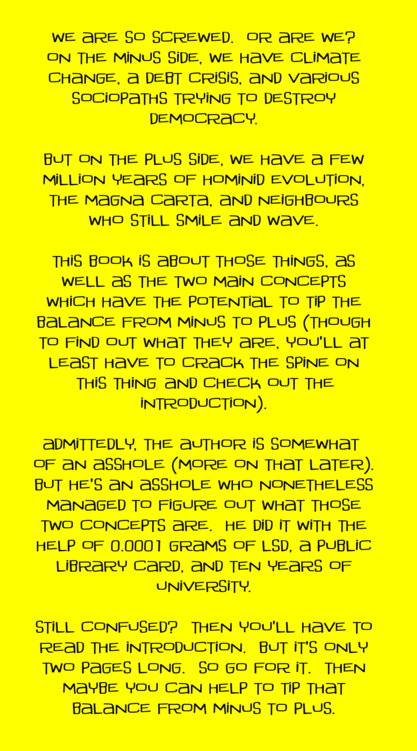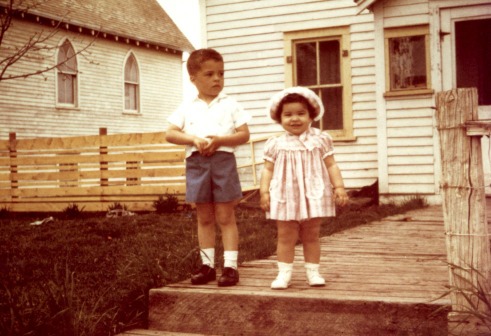
1

2

3

CIVILIZATION
FOR
MORONS
(A PERSONAL JOURNEY)
16�� D����
2021
B� E��� B������
P�������� ��
___________________ ?
4
This book is
dedicated to my younger
self, in the hope that he
might learn something.
All authorial proceeds
from the sale of this book
will go to the
New Democracy Foundation.
www.newdemocracy.com.au
(I would love to direct this $
to a similar Canadian organization,
but the closest equivalent seems to be
MASS LBP, which is a private
consultancy, rather than a
non-profit organization.
I am, however, open
to suggestions.)
5
Three Themes
in Four Quotes
The smartest person in the world
is that person who knows
where the shoe pinches
on his/her own foot.
Paraphrase of an Irish proverb
If the pus from a dead dog’s boil
gives enlightenment,
then it should be prized
as the finest elixir.
Paraphrase of a Tibetan proverb
Sooner murder an infant in its cradle
than nurse unacted desires.
William Blake (18th/19th century poet)
Everyone is entitled to his own opinion,
but not his own facts.
U.S. Senator (1977-2001)
Daniel Patrick Moynihan
6
The Dog’s Breakfast
Introduction..Preface…Warning… ..................................9
chapter i: the early years ............................................12
chapter i : the party years ..........................................23
chapter i i: a girl .......................................................30
chapter iv: LSD ...........................................................33
chapter v: books .........................................................48
chapter vi: berkeley ....................................................60
chapter vi : dreadlocks and tattoos .............................77
chapter vi i: university ...............................................86
chapter ix: fighting fires and spotting smokes ..............92
chapter x: women .....................................................103
chapter xi: more university ......................................112
chapter xi : more university (in rhyming verse) ..........152
chapter xi i: guatemala .............................................158
chapter xiv: india .....................................................172
chapter xv: old hymns and medieval drinking songs .....188
chapter xvi: science and religion and death...and sasquatches .............................................................197
7
chapter xvi : ottawa .................................................213
chapter xvi i: a woman ..............................................245
chapter xix: newspaper columns .................................247
chapter xx: sitting in a church pew with a sense of detached irony .........................................................252
chapter xxi: civilization? ...........................................259
8
Introduction…Preface…Warning…
Are you sometimes unable to sleep at night, thinking about an uncertain global future? Like that associated with runaway climate change?...or a new covid variant?…or one of the Trump kids in the White House in 2024?
No? Then you may as well put this book back on the shelf.
For those of you remaining, let me introduce myself. My name is Evan, and like you, I’m also unable to sleep at night. That’s because I spent many years at university, studying "societal sustainability"
and I'm not very optimistic.
I did, however, find the two main concepts which can fix our rapidly disintegrating civilization. One of them is called
"communitarianism" and the other is called "deliberative democracy".
Communitarianism is simply defined as a society which has a better balance between personal freedoms and collective responsibilities (if you gladly wore a mask and got vaccinated in 2020/21, you likely already know about the latter).
Deliberative democracy, however, is a bit harder to explain. So I’ll first describe what it is not. It is not what we have now, where a polling firm asks a random selection of people what they think about a very serious issue (let's say climate change), and even though many of the respondents might not know the difference between a methane molecule and a giraffe, they’ll still give answers about which policies they prefer. Then these answers are fed back to politicians, who allocate dollars and make laws based on them.
That's somewhat more advanced than Medieval Europe, but not much.
Contrast that with deliberative democracy, which involves – you guessed it – deliberation. And a couple of good examples were the Citizens' Assemblies on Electoral Reform held in BC and Ontario in 2004 and 2007 (though the subsequent referenda were prime examples of what are often toxic, non-deliberative processes).
9
Before we go any further, I want to assure you that I'm not a nut-case. Deliberative democracy and communitarianism have other backers with far more letters behind their names than I'll ever have.
Charles Taylor, for example, who is a recipient of the Order of Canada, and who did the Massey Lectures back in 1991, was one of the many contributors to a very important book titled Changing Maps (Carlton University Press, 1995). And that book is still the most profound – and readable – collection of words ever written about these two subjects. The problem is that 99.99% of the population is unaware that the book ever existed.
So what, therefore, is the average 21st Century insomniac supposed to do? Or rather, what did my younger 20th Century self do? At that time, there was only one option: I had to cycle from Edmonton to Ottawa, in order to try and give a copy of Changing Maps to Jean Chretien (who was Prime Minister at the time). And a significant part of this book is about that quixotic episode.
Aside from chapters on “public consensus”, “social infrastructure”, and the “crisis of legitimacy”, Changing Maps also includes a section on “Culture and Values”. In it, the authors state that in order to counteract the potential for “post-modern nihilism”
and "a pell mell jailbreak into hedonism, violence and general disaffection from society" (p.35), we should consider re-visiting,
"perhaps with some irony" (p.38), that ancient anachronism we call religion. In my book, I take the discussion much further, looking at religion versus spirituality, belief versus experience, and experience versus physical evidence. I look at it all through the lens of my personal encounters with cannabis and LSD, as well as a disappointing pilgrimage to India, and half a lifetime spent scouring library shelves for concepts such as Carl Jung’s "collective unconscious" and Albert Einstein's "spooky action at a distance"
(more on that stuff later).
I will admit that this book is somewhat of a chaotic mess. You will have the opportunity to read not only about that cycling trip to Ottawa, but also about my earlier quest to find a hippie commune in California. You’ll be free to scoff at the details of my first LSD trip, as well as laugh at the details of how I lost my virginity. You might 10
squirm as I try to explain capitalism versus socialism, or Alberta versus Norway. But I guarantee it will all be somewhat entertaining, somewhat educational, and generally chopped up into mercifully brief, digestible chunks.
And besides: we all love chaotic messes that are mercifully brief.
The internet is chaotic, and we can’t fathom how our brains used to operate before it came into existence. Gone are the days when the average person could wade through more than a single paragraph of Thoreau’s Walden without running from the room, screaming for the comfort of a few pixels on an LCD screen. So don’t worry. Just grab a beer (or a glass of wine or a spliff), crack the spine on this thing, and you’ll be just fine.
11









